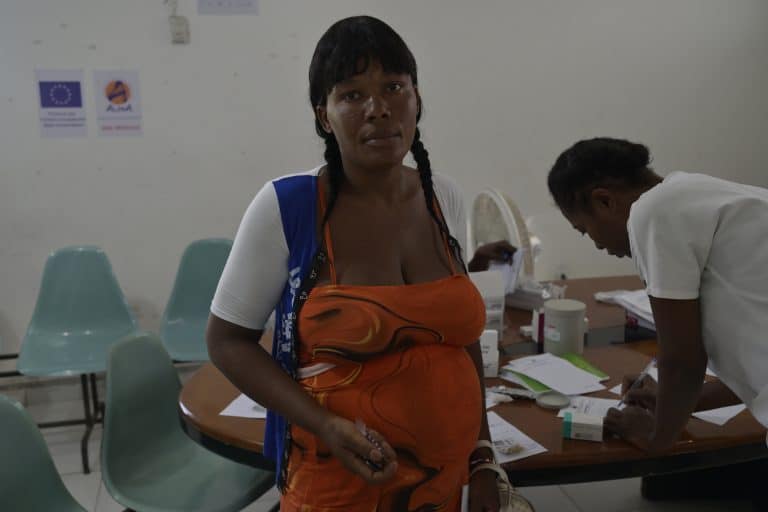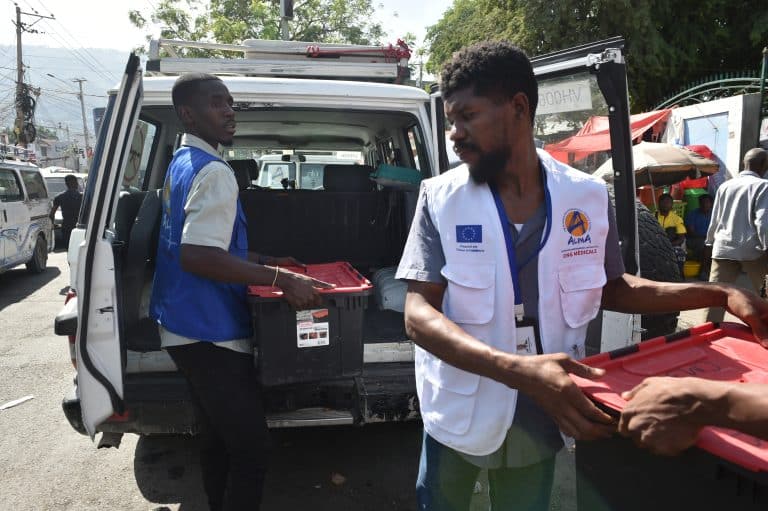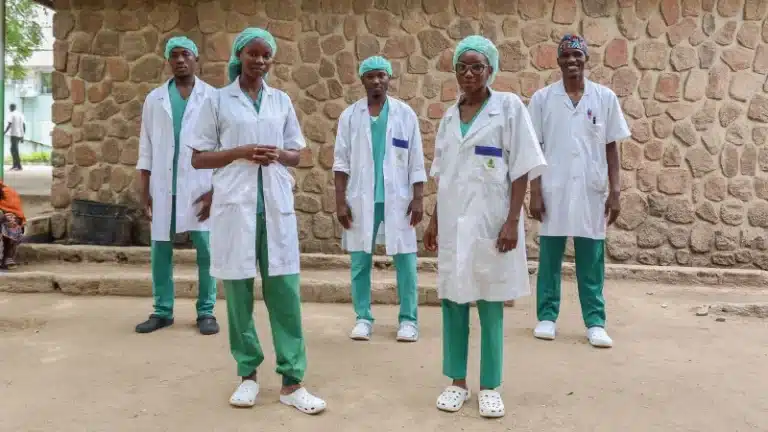Strengthening the health system
- 95% of ALIMA’s workforce comes from the countries where it operates, reinforcing local expertise.
- 643 people trained in 2024 to improve the quality of care.
- 58 beneficiaries of the Individual International Training Fund have received co-financing for a diploma or qualifying training.
In humanitarian and healthcare contexts, developing local skills is key to improving the quality of medical care and ensuring an effective response to crises. ALIMA provides training for health workers and Ministry of Health teams in medical treatment, nursing care, and health data management. We also support national health information systems to strengthen epidemiological surveillance and data analysis.
Our approach includes a key community component: the training of community relays and local leaders. They play an essential role in prevention, mobilization of populations, and the rapid detection of epidemics. By developing these skills, ALIMA contributes to a more autonomous and sustainable healthcare system.
Humanitarian context and challenge
The urgent need to strengthen medical skills
In resource-limited countries, the lack of specialized training limits the quality of care and the response to health crises. Challenges include:
- Limited access to advanced medical training, particularly in epidemic management and pediatric emergencies.
- Insufficient availability of skills training adapted to humanitarian contexts.
- Shortage of local expertise on certain pathologies, requiring capacity building.
💡 Why does this matter?
- Training local healthcare workers is essential for an effective and sustainable response.
- Health crises require qualified professionals capable of acting quickly.
- A stronger health system reduces dependence on external aid and improves community resilience.
📌 ALIMA is investing in training healthcare workers, crisis managers, and the leaders of tomorrow.
➡️ To address these challenges, ALIMA develops tailored and innovative training courses to strengthen medical and organizational skills.
ALIMA’s action
💡 How does ALIMA strengthen local health systems?
ALIMA adopts an integrated approach to develop medical skills and improve the autonomy of local actors through various training programs.
🔹 Training courses leading to qualifications and diplomas
🎓 The Individual Fund for International Training
- A scheme allowing ALIMA employees to access training leading to diplomas and qualifications, with co-financing covering 50% to 75% of the costs.
- Goal: strengthen professional skills and recognize the value of healthcare workers through certified training.
🔹Practical on-the-ground training
🏥 Training the national health workforce
- Establishment of “URENI-Schools” (Intensive Nutritional Education and Rehabilitation Unit) in Mali, Chad, Cameroon, and Nigeria.
- The aim is to train health workers in managing complications related to acute malnutrition in children.
🛠Training adapted to local contexts
- Sessions tailored to the needs of each field of intervention.
- Personalized approach for nurses, midwives, doctors, and humanitarian logisticians.
🔹 Training trainers and mentorship
👩🏫 Adult moderation skills training
- The goal is to equip facilitators with the skills to lead training sessions within their teams.
- Aimed at medical managers, project coordinators, and supervisors.
🤝 Mentorship program for heads of mission and coordinators
- Support for humanitarian project management and leadership.
- The aim is to develop strategic and managerial skills to better manage medical interventions.
🔹Specialized training in epidemiology and biostatistics
📊 EPISTAT training (Epidemiology and Medical Statistics)
- Intended for medical referents, nurses, and doctors working in the field.
- The goal is to analyze health data and develop research projects adapted to the contexts of intervention.
📌 Every year, ALIMA organizes EPISTAT sessions to strengthen the capacity for analysis and response to health crises.
Frequently Asked Questions (FAQs)
- It empowers local healthcare workers to act autonomously and efficiently.
- It enhances the quality of care and strengthens management of health crises.
- It facilitates skills transfer and fosters the development of local expertise.
- Healthcare professionals in ALIMA’s intervention countries.
- Coordinators and heads of mission.
- Medical teams from partner Ministries of Health.
- This is a co-financing program supporting ALIMA staff in obtaining diplomas and professional qualifications.
- ALIMA covers between 50% to 75% of the training costs.
On the ground
Related news

Chancerelles: A Historic Maternity Hospital Reborn Amid the Crisis
In Cité Soleil, a municipality of the Port-au-Prince metropolitan area weakened by years of armed violence and the absence of public services, the Isaïe maternity

In Port-au-Prince Camps, Access to Healthcare Remains a Major Challenge for Displaced Populations
In Port-au-Prince, thanks to its mobile clinics and a strong network of community health workers, ALIMA is restoring regular access to healthcare for displaced populations,

NPR highlights ALIMA’s work in Cameroon
The U.S. media outlet NPR dedicates an episode of its podcast Planet Money to ALIMA’s work in Cameroon’s Far North region, at a time of


